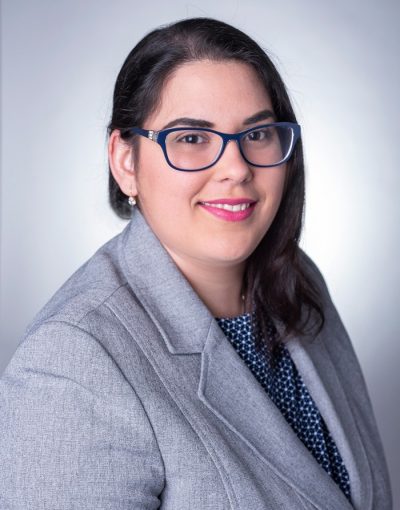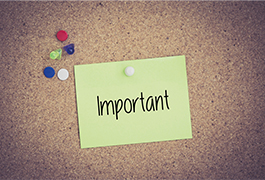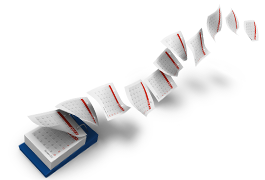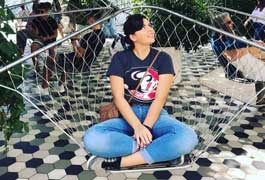Grad Student Isel Rivera Turns a Difficult Beginning into a Steady Stream of Growth
Isel Rivera’s path to graduate school was neither quick nor easy. Her undergraduate years combined a full-time job, family obligations, political persecution, language barriers, and other stressors with her science courses and research. With help from the ACS Bridge Program, a preparatory program designed to support and mentor underrepresented students in the chemical sciences in their pursuit of graduate education, Isel is now a second-year doctoral student at Indiana University studying the interaction of nanoparticles with immune cells.
Isel shares how she landed on a path to success.
What made you want to pursue science as a career?
Unfavorable social and economic circumstances in Cuba affected my education. The lack of labs, educational materials, comprehensive education, running water, current books, and internet obstructed my academic growth. There were no cell phones in Caibarien, where I grew up, but I had plenty of inspirational moments, like watching my parents practice medicine with little resources and learning bravery and social skills with friends.

In spite of setbacks, I was propelled by my scientific curiosity. I achieved valedictorian in middle school and ranked third among students entering the only science high school in the state— Ernesto Guevara Vocational Preuniversity Institute of Exact Sciences. I knew I wanted to become a scientist while at a recruiting event at the high school. I was captivated by a burning magnesium strip that a chemistry graduate student at Universidad de Villa Clara, Cuba, demonstrated. As I was observing the strip burn, I thought to myself: “This is really cool. I want to feel this excited the rest of my life. In the future, I will evolve into a scientist.” When I decided to go for chemistry as a career, I realized that learning, problem solving, delivering on goals, and coming up with solutions is me perfectly.
Who inspires you?
My parents’ teachings inspired me to be curious about all science. My mom taught me about medicinal concepts, astronomy, and biology. My dad debated about how things worked in the body, and he taught me how to work through problems. My high school educators Ms. Carrillo, Ms. Rodriguez, and Ms. Abella motivated me to work hard and focus on my career goals. Shahedul Islam, the graduate student who supervised me during my undergraduate career, , inspired me to be persistent and tenacious. My undergraduate mentor, Dr. Li June Ming, motivated me to be studious and always be curious—all qualities of a good scientist. Lastly, my career in science grew thanks to the person who has inspired, supported, and urged me to think critically: my husband Michael.
What challenges did you face getting into graduate school? How did the ACS Bridge program help?
Many people believed in me while others doubted my abilities and did not understand my situation, maybe due to cultural differences or a language barrier. A majority of Cuban immigrants suffer from pre- and post-migration stressors like political persecution, financial struggles, and assimilation or acculturation problems.1 Unfortunately, I was in the majority, experiencing these issues during eight years of undergraduate schooling. My daily routine included working full-time, supporting other family members, making time for school activities, studying for science courses, and doing undergraduate research. Sometimes my living conditions lacked reliable transportation and a quiet study area. Many times my academic growth was slowed down by psychological pressures. These obstacles included learning a new language and culture, overcoming the loss of a family member, and battling with constant anxiety and imposter syndrome. I struggled a lot during my undergraduate years, feeling like an outsider at times, or questioning whether my academics were good enough to pursue higher education. However, with a dose of commitment, I survived and graduated earning a BA in in biochemistry/biotechnology from the University of South Florida (USF).
The ACS Bridge fellowship helped in eliminating adversities from undergraduate years and allowed me to focus and develop as a chemist. The program removed major obstacles of standardized requirements, helped me evaluate my aptitude to be a scientist, and helped me choose the chemistry doctoral program at Indiana University to pursue my education. It also provided for my livelihood.
What other resources did you tap into before applying to grad school?
Before going into graduate school, I participated in student-led organizations, which is a great way to network and get information. I started my career at Hillsborough Community College (HCC), in Tampa. At HCC I represented the school as president of the student government and member of Phi Theta Kappa honor society. When I transferred to USF, I participated in the university’s ACS student chapter. Through these organizations, I collected valuable skills. I learned how to communicate better with my peers, organize events, and practice leadership skills. Also, I participated in several professional development events. Career fairs sometimes were places for inquiry, and chemistry seminars opened my eyes to other aspects in the field.
USF also had an undergraduate research and career center that provided seminars for students on how to build curriculum vitae, résumés, statements of purpose, among other professional development advice. I actively participated in undergraduate research for about three-and-a-half years. Undergraduate research changed my life by helping me decide on pursuing a doctoral degree in chemistry as well as building technical, qualitative, and life skills along the way.
What was your experience like with the Bridge Program?
The Bridge program provided a lot of flexibility. For example, when I applied for the ACS Bridge program, GRE scores were not required. Because English is my second language, it was difficult to achieve GRE scores comparable to native speakers. The language barrier hindered my performance and opportunities to prove my full potential to complete a chemistry program.
When I felt ready to start applying for graduate school, the process was tedious and lacked incentives. The ACS Bridge application was smooth, and if accepted, it provided financial and developmental assistance for two years. The program distributed my application to a number of schools and on my undergraduate graduation day, I received an acceptance letter from Indiana University (IU) to their chemistry program. I didn’t have faith in my chances to enter such a good school. After discussing with my husband, he convinced me I was worthy of acceptance. After accepting the ACS Bridge fellowship, Dr. Sara Skrabalak, the ACS program director at IU, helped me transition from Florida to Indiana. With assistance from the ACS Bridge program and Dr. Caroline Chick Jarrold (IU chemistry department chair), I was able to move and settle into Bloomington, IN. Before classes started, I met with the American Physical Society (APS) Bridge fellows from the physics program to begin building an on-campus community, and I met with many potential research advisors.
The decision of which classes to take was also very flexible due to the fellowship. I had the choice of taking upper undergraduate classes or graduate courses--I chose to take graduate classes, which helped me keep up with classmates. In agreement with the fellowship, the school assisted in finding tutors that aided in developing study skills and educational training.
In fall of 2020, the ACS Bridge program partnered with APS and others to grant me a travel award to the Inclusive Graduate Education Network (IGEN) national meeting, which has a series of networking events, including participating in laboratory tours of NASA, talking one-on-one with representatives and industry professionals at national labs, participating in seminars, and presenting research.
As part of the fellowship initiative, I had the opportunity to be mentored by the program’s director Dr. Sara Skrabalak. She helped me identify weaknesses and professional development opportunities. Also, the program director has worked with my mentor Dr. Yan Yu to help in my academic development. What is more, being a fellow instead of a teaching assistant has helped me focus on learning and building knowledge. As a fellow, you make connections with other fellows at other schools and become a part of a cohort of students that are tipping the scales at primarily white institutions.
What research are you doing now?
Currently, I have finished the first-year requirements on introduction to research and I have written a 20-page manuscript. My research investigates how exosomes (natural) and Janus (synthetic) nanoparticles affect immune cell internalization, uptake, and cytotoxicity. These interactions must be studied due to the increase of nanoparticle production in medicine and in the world. Understanding whether nanoparticles negatively interact with immune cells is important, because these cells are the first line of defense in our bodies. Knowledge about how the different properties of nanoparticles might affect immune cells could help other researchers design better drugs and products.
What do you want to do when you complete grad school?
I want to be within a company that values my experiences as well as my professionalism. I would love to work in the nano-medicinal field applying the knowledge gained from my nanotechnology at the interface of biology/chemistry.
The Bridge program is helping provide the academic foundation, networking connections, and professional development experiences I need, and it will help me become a unique chemist. The IU Chemistry program and the interactions in Dr. Yan Yu’s group are also building my knowledge and competencies as a scientist.
When you’re not studying or doing research, what do you like to do?
Balance between work, study, and home life is crucial. I appreciate making schedules, daily checklists, and writing my goals down for the week, which help me stay organized and enjoy life after work. I love playing with my two cats Gino and Annie as well as spending time with my husband. To relieve stress, I enjoy doing yoga, embroidery, painting, writing poetry, and crafting. Other enjoyable activities for me are watching anime, cooking, and going out to eat. I also enjoy chatting with friends and working on my social media presence on Twitter and LinkedIn, plus building my own blog, ChattyPhD. In the blog I give background on different students and my stories with the hopes to be a role model to undergraduate students and encourage them to go for a chemistry or a science career-- a subject I am very passionate about.




